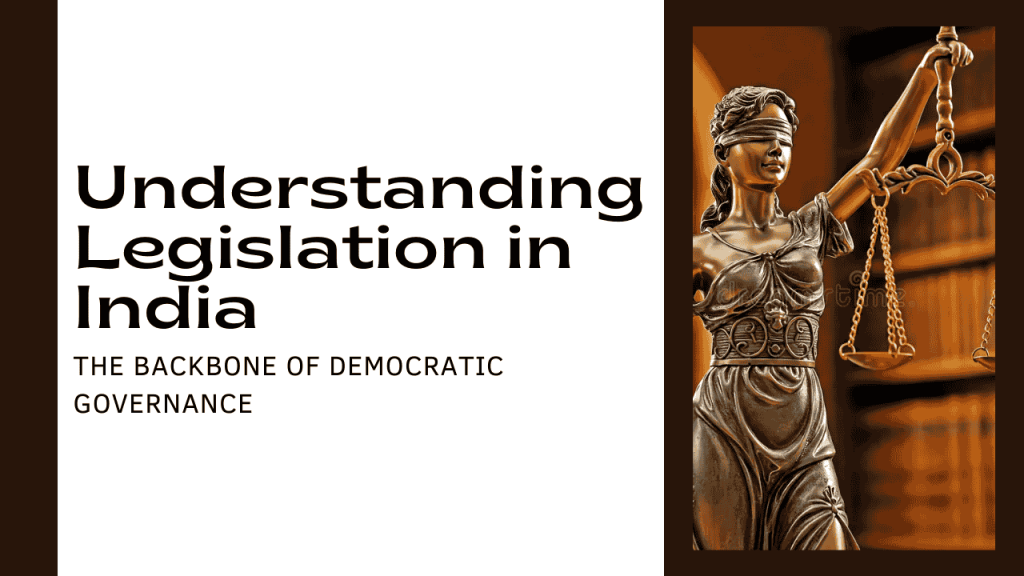
In any functioning democracy, laws are the invisible threads that hold the social fabric together. They govern our rights, duties, and interactions within society. In India—a vibrant democracy with over 1.4 billion people—legislation plays a crucial role in shaping the nation’s political, economic, and social dynamics. But where do these laws come from? How are they made? And how can citizens stay informed about them? The answer lies not just in textbooks or parliamentary debates but also in accessible digital platforms like legislative.gov.in, the official website of the Legislative Department of India.
This article explores the concept of legislation in India, breaks down the legislative process, and explains the role of the Legislative Department and its digital initiatives in bringing transparency and participation into lawmaking.
What Is Legislation?
In simple terms, legislation refers to the process of making laws. These laws are formal rules that regulate the behavior of individuals, organizations, and governments. In India, legislation is primarily the work of Parliament and state legislatures, depending on whether the subject matter is part of the Union, State, or Concurrent List under the Constitution.
But legislation is more than just rules written on paper. It reflects a nation’s priorities, values, and visions for the future. It affects everything from education and healthcare to the environment, business, and civil liberties.
Structure of the Indian Legislative System
India follows a bicameral system at the central level:
- Lok Sabha (House of the People): Directly elected by the people.
- Rajya Sabha (Council of States): Represents the states and union territories.
At the state level, most states have unicameral legislatures (only a Legislative Assembly), although a few like Uttar Pradesh and Maharashtra, have a bicameral system (Legislative Assembly and Legislative Council).
The Constitution of India empowers these legislative bodies to frame laws on subjects mentioned in the Seventh Schedule, which divides powers into three lists:
- Union List (e.g., defense, foreign affairs)
- State List (e.g., police, public health)
- Concurrent List (e.g., education, marriage laws)
The Legislative Process: From Idea to Law
The journey of a law begins long before it is passed. It goes through a multi-stage process involving scrutiny, debate, and sometimes significant revision. Here’s a simplified breakdown:
1. Drafting the Bill
The process starts with a draft bill, usually prepared by a ministry or department. Experts, stakeholders, and legal advisors weigh in during this phase. This draft may be uploaded on platforms like legislative.gov.in or circulated for public feedback in certain cases.
2. Introduction in Parliament
Once approved by the Cabinet, the bill is introduced in either house of Parliament. It is termed as a Government Bill if introduced by a minister or a Private Member’s Bill if introduced by a member not part of the ruling government.
3. First Reading
The bill is introduced and published. No discussion on its content occurs at this stage.
4. Second Reading
This is the crucial stage, divided into three sub-stages:
- General Discussion: Members debate the bill’s principles.
- Committee Stage: Referred to a Standing Committee for detailed scrutiny.
- Consideration Stage: Suggestions from the committee are discussed and incorporated.
5. Third Reading
The final version of the bill is debated and voted on.
6. Approval from Both Houses
Both Lok Sabha and Rajya Sabha must pass the bill in identical form. In case of a deadlock, a joint session may be called.
7. President’s Assent
After passing both Houses, the bill goes to the President of India for assent. Once signed, it becomes an Act and is enforceable by law.
Role of the Legislative Department
The Legislative Department under the Ministry of Law and Justice plays a pivotal role in this entire process. Its responsibilities include:
- Drafting of principal legislation and amendments.
- Translating laws into Hindi and other regional languages.
- Maintaining records of Central Acts and repealed laws.
- Providing legislative advice to government departments.
With digital evolution, the department has expanded its accessibility through online platforms, making legislative information available to citizens, lawyers, scholars, and journalists alike.
legislative.gov.in: Making Law Accessible
The official website https://legislative.gov.in is a comprehensive repository of legislative activity in India. It serves as a transparent window into the lawmaking machinery, offering features like:
- Central Acts from 1836 to the present.
- Bare Acts with full text and amendments.
- List of repealed laws.
- Bilingual versions (English and Hindi).
- Updates on Ordinances, Rules, and Regulations.
- Tools for searching laws by year, title, or keyword.
It also contains links to initiatives like the India Code Portal, which aims to create a unified database of all Indian laws.
This platform bridges the gap between government policy and public understanding. For students, lawyers, journalists, and everyday citizens, this website is a goldmine of legal clarity and civic empowerment.
Recent Legislative Trends and Challenges
The Indian Parliament has passed several significant laws in recent years, from the Goods and Services Tax (GST) to the Abolition of Article 370 and the Citizenship Amendment Act (CAA). Each of these laws triggered widespread debates and protests, reminding us that legislation is not just a bureaucratic process—it’s often a political and social battleground.
Some current challenges include:
- Speed vs. Scrutiny: Bills are often passed rapidly, sometimes with minimal debate.
- Limited Public Involvement: Unlike in some countries, India still lacks robust public consultation mechanisms in early legislative drafting.
- Complex Legal Language: Laws are often written in technical jargon, making it hard for common citizens to interpret.
Despite these hurdles, platforms like legislative.gov.in are making commendable efforts to democratize legal knowledge.
Why Citizens Should Care About Legislation
Understanding the legislative process isn’t just for lawyers or politicians. Every citizen has a stake in it. Here’s why:
- Empowerment: Knowing your rights and laws helps you stand up for them.
- Accountability: You can question your representatives on their legislative actions.
- Participation: You can give inputs during pre-legislative consultations.
- Awareness: Knowing what laws exist can help you avoid legal troubles or take advantage of rights and schemes.
When you understand legislation, democracy becomes more than just voting every five years—it becomes an ongoing relationship with governance.
Final Thoughts
In a country as diverse and complex as India, legislation is the thread that weaves unity in diversity, and legislative.gov.in is a key portal to understanding that thread. With free access to laws, drafts, ordinances, and updates, it empowers every Indian to engage with the country’s legal and democratic processes.
In the end, laws are not just made in Parliament—they are made for the people and, ideally, with the people. By exploring and utilizing platforms like legislative.gov.in, we take one step closer to becoming a more informed, empowered, and participative democracy.














The more you rewrite, the funnier it gets — pluscomedy.com